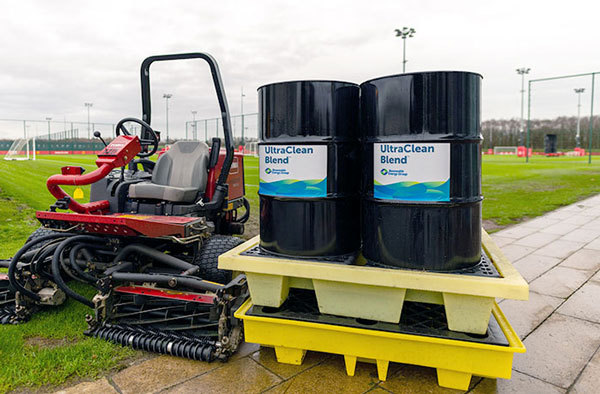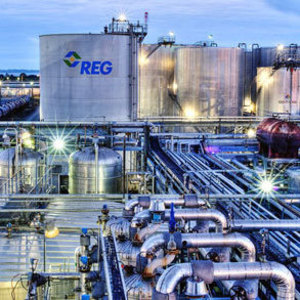Catalyzing Decarbonization



PHOTO: RENEWABLE ENERGY GROUP
June 3, 2022
BY Anna Simet
It only took Renewable Energy Group a couple of decades to become a biofuel industry force. The Ames, Iowa-based company is now the leading producer of biodiesel in the U.S. and fourth-largest in the world, and has attracted the business interests of oil giant Chevron. In late February, Chevron announced its intentions to acquire REG later this year. Mike Wirth, Chevron CEO and chairman, was transparent with the motive behind the acquisition: REG’s expertise in feedstock sourcing and its market access are second to none, and an attractive means of bolstering the company’s renewable fuel business. “REG has been a leader in sourcing and aggregation of feedstocks—particularly lower-carbon intensity feedstocks,” Wirth said during a teleconference following the announcement. “This is an area where REG has distinguished itself. It’s an area that we don’t—to be completely blunt—have the expertise. We’ve been moving into these markets, but REG brings decades of experience and people who have relationships and technical understanding that we simply don’t have.”
The all-cash transaction is valued at $3.15 billion. On May 18, REG stockholders approved the acquisition.
In late March, REG announced the rebranding of its biofuel product line, EnDura Fuels, with five different brands: InfiniD (biodiesel), PuriD (biodiesel for use in higher biodiesel and renewable diesel blending) VelociD (renewable diesel), Ultra Clean BlenD (a blend of VelociD and PuriD) and BeyonD (sustainable aviation fuel). Cynthia Warner, REG’s CEO—who is expected to gain a seat on Chevron’s board of directors—unveiled EnDura Fuels during a live webcast, emphasizing the urgency of adopting decarbonization solutions that are available in today’s marketplace. “REG has more than 1,000 employees in Iowa and across the world, and never has there been a more important time to work in the renewable fuels space,” she says. “Policymakers and consumers are demanding adequate and reliable fuel supplies in these uncertain times, and the decarbonization of those fuels.” Warner says that although there are many highly touted decarbonization solutions, many are decades from true scale and cannot offer the type of progress needed right now. “It’s important to stop and ask: What’s the cost of waiting for solutions not yet available?”
As for the strategy behind giving these products their own distinct names, in so many words, Bob Kenyon, REG vice president of sales and marketing, says it’s to help consumers understand each product and what it can do, while disassociating them from diesel products. “We want customers to be able to relate to products that perform like diesel, but understand they are low-carbon and clean energy solutions,” he tells Biodiesel Magazine. “They might know biodiesel and renewable diesel are in the marketplace, but they may not necessarily understand what those products do, because they’re related to the fossil diesel category. Our position with EnDura Fuels is to help customers realize there are products in the marketplace available today—and we wanted to help them differentiate between different blends and products, as well as their performance and applications.”
New Partners, New Markets
Kenyon highlights several recent partnerships with customers in a spectrum of industries, one of which is Manchester United, a professional football club based in Greater Manchester, England. MU will use EnDura Fuels in groundskeeping equipment, after 100-plus years of petroleum diesel.
Teaming up with mobile fueling service Booster, REG will supply renewable diesel, biodiesel and blended fuels to fleets in California (and in late May, Booster announced nine-figure Series D funding). Another notable example is Canadian Railway Co. and Progress Rail, a Caterpillar company, which have partnered with REG to test high-level biodiesel and renewable diesel blends, potentially helping speed up the pace for widespread rail adoption. “We’re excited to partner with the rail industry and OEMs,” Kenyon says. “It’s real for them. Their customers, suppliers and investors are asking them to reduce their carbon footprints. And we’re seeing that in other spaces as well—specifically, the marine space, which is another industry that has been slower to adopt low-carbon fuel solutions. We’re partnering with some of the largest container shipping and bunker fueling companies, for B30, B40, B50 and up to B100 powering ships. These emerging markets are starting to unfold.”
Feedstock and Production
Earlier this year, consulting company Cerulogy released a report exploring the impacts of renewable diesel capacity on oil and fats markets in the U.S.—in summation, the report said that considering the cascade of announcements for new renewable diesel projects, it is unlikely the full announced capacity will be reached—largely in part due to limits on feedstock availability—and likely that many projects will be delayed, canceled or run far below capacity. Other reports have indicated similar predictions. When asked about feedstock constraints, Kenyon was bullish on the outlook for REG. “Feedstock is obviously a key to success,” he says. “And feedstock innovation. We’re partnering for some unique opportunities, and novel feedstocks are being tested right now in our labs and biorefineries. REG already works with a number of different feedstocks that people may not be aware of—beyond cooking oil, white grease and distillers corn oil—and they have tremendous growth potential as the industry evolves. As demand continues to increase, we’ll continue to innovate to create feedstock abundance.”
As for specific examples of the novel feedstocks Kenyon refers to, he says he cannot not disclose specifics at this time, but he says cover crops and creation of a new seed crop are a couple of opportunities on the table.
As for production, REG currently has 11 facilities—two in Europe and one the U.S. In 2021, the company produced an approximate total of about 550 million gallons of renewable fuels. Out of that, roughly 450 million gallons were biodiesel and 100 million were renewable diesel. The ongoing expansion of REG’s Geismar, Louisiana, renewable diesel plant is expected to be complete at the end of 2023, according to Kenyon, which will add 250 million gallons of capacity. “So, our portfolio balance will be close to a 50/50 ratio of renewable diesel to biodiesel when that production comes online,” he says. In a quarterly earnings report in early May, REG reported that while biodiesel production was down slightly due to the shuttering of its Houston plant in late 2021, renewable diesel production was up 42% for the quarter.
Accelerating Adoption
Kenyon says the company plans to press full speed ahead to enable more customers to transition to biodiesel and renewable diesel. “We really want to help customers in certain markets understand and embrace these fuels. They have an option to make an impact right now—fleets can be converted today. There are some tough, complicated choices, but this is this is the simplest way to decarbonize in today’s market.”
With global energy prices surging and the need for more domestic energy production more critical than ever, the significance of REG’s mission is irrefutable. “The case for biofuels has been made for years, but it has been the past couple of years we have we have really seen consumers with large carbon reduction targets, and regulatory policy that incentivizes the adoption of low-carbon fuels,” Kenyon adds. “I think people are beginning to understand that our ability to produce renewable fuels does give us security of supply and energy independence, and not just decarbonization.”
Author: Anna Simet
Editor, Biodiesel Magazine
asimet@bbiinternational.com
701-738-4961
Advertisement
Advertisement
Advertisement
Advertisement
Related Stories
The U.S. Department of Energy’s Office of Energy Efficiency and Renewable Energy is soliciting public comments on a preliminary plan for determining provisional emissions rates (PER) for the purposes of the 45Z clean fuel production credit.
On July 17, Iowa’s cost-share Renewable Fuels Infrastructure Program awarded $1.12 million in grants for 20 applicants to add B11 and 4 applicants to add E15 to retail sites. This was the first meeting following the start of RFIP’s fiscal year.
Par Pacific Holdings Inc., Mitsubishi Corp. and ENEOS Corp. on July 21 announced the signing of definitive agreements to establish Hawaii Renewables LLC, a joint venture to produce renewable fuels at Par Pacific’s refinery in Kapolei Hawaii.
A new study published by the ABFA finds that the U.S. EPA’s proposal to cut the RIN by 50% for fuels made from foreign feedstocks, as part of its 2026 and 2027 RVOs, could stall the growth of the biomass-based diesel (BBD) industry.
The U.S Department of Energy Bioenergy Technologies Office, in partnership with the Algae Foundation and NREL, on July 21 announced the grand champion and top four winning teams of the 2023 - 2025 U.S. DOE AlgaePrize Competition.
Upcoming Events










